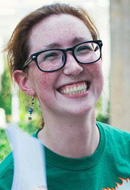Two rooms, 27 tables, 162 chairs, one hour, and one gospel message: all the ingredients to a free lunch on campus at the University of Texas at Dallas. It seems like the one thing we keep talking about here at the UTD Baptist Student Ministry is how much lunches have grown. From a maximum of around 80 students a year ago to more than 200 weekly this spring, it is certainly something to talk about.
 Kinsey ClineThe growth has made some of the logistics of lunch more difficult. Churches have risen to the challenge, and God has provided food for all these students—far more than we expected or imagined. We still are struggling to find a student or volunteer leader to facilitate discussions at each table, but the numbers are growing, and we now only have six or seven tables without discussion leaders, while 20 or so are staffed by a BSM member or church volunteer.
Kinsey ClineThe growth has made some of the logistics of lunch more difficult. Churches have risen to the challenge, and God has provided food for all these students—far more than we expected or imagined. We still are struggling to find a student or volunteer leader to facilitate discussions at each table, but the numbers are growing, and we now only have six or seven tables without discussion leaders, while 20 or so are staffed by a BSM member or church volunteer.
These table leaders do their best to engage the students who sit with them in conversation. We might ask about classes, the weekend, the students’ families or religious backgrounds. After everyone has gotten food, we move into the discussion for the week. This semester, we are talking about “holy vocabulary” words, such as “sin,” “love,” “holy” and “justice.”
We have grown more organized about having our leaders sit at the same table each week, which has served two good purposes. First, students can sit at the same table week after week, which builds the relationship between the non-Christian and the BSM leader. Second, student leaders can let those they invite to lunch know at which table they will be seated, so it doesn’t feel so daunting to enter a room for lunch with 200 strangers.
Some engage, some don’t
There always are some students who come only for the food. It is hard to get them to converse with you or answer any questions. They leave as soon as they’ve finished eating. We are happy to provide a free meal to these students, and hope eventually they question why we continue to do what we do and begin to consider the gospel message. But for those students who engage in discussion, free lunches are our best opportunity to reach out and share the gospel. We intentionally structure our discussion questions so that it is easy to lead into a gospel message as conversation continues.
Recently, I was able to share the gospel with someone before lunch even started. She and I were the only ones at my table, and I knew she had been coming to lunch all year, so I asked her what she liked about them. Apart from the free food, which she appreciated, she said she really liked the opportunity to talk about religious things, because she didn’t find that anywhere else on campus. She said most of the conversation she had outside of our lunches was about classes, homework and projects, but she liked the chance to come to lunch and discuss spiritual matters.
Sharing the gospel
She is Hindu and shared with me some of her beliefs, while also letting me tell her the main message of Christianity—the gospel. She also told me she plans to attend an event we are having soon to hang out and get to know more people. Lord willing, this relationship will continue to grow, so that she will be able to hear and see more of the gospel of our great Savior.
If lunches continue to grow as they have been doing this school year, we will have to rethink and restructure again. But what a good problem to have! We are praising God for the opportunity to reach so many students at UTD, and we are trusting him to continue providing the necessary ingredients.
Kinsey Cline, a graduate of the University of Texas at Dallas, is serving with Go Now Missions as a campus missionary intern at her alma mater’s Baptist Student Ministry.















We seek to connect God’s story and God’s people around the world. To learn more about God’s story, click here.
Send comments and feedback to Eric Black, our editor. For comments to be published, please specify “letter to the editor.” Maximum length for publication is 300 words.